CHICAGO — Consumer concerns around climate change have increased as more people around the globe experience extreme weather events, according to a consumer survey from the market researcher Mintel.
The study found that 46% of consumers cited climate change as a top three environmental concern this year compared with 39% in 2021. Climate change was the most popular response, with a third citing plastic pollution. There was also a notable rise in consumers citing water shortages and food shortages as top concerns.
“The fact that concerns around climate change and water and food shortages are being prioritized ahead of previous preoccupations with waste and plastic pollution points toward the emergence of a more informed and hardened global consumer,” said Richard Cope, senior trends consultant for Mintel. “Soaring temperatures, extreme weather events and disruptions to food, water and energy supply chains have given consumers a harsh reality check, hurting their health and wallets, and activating them in the process.”
A look at consumers’ attitudes toward sustainability found that 68% said doing things that benefit the environment make them feel happy and 38% said they want to show other people that they are helping the environment through methods like social media.
Consumers cited recycling (58%) and avoiding food waste (53%) as their most common sustainable behaviors, mirroring findings from a report published by Innova Market Insights, Arnhem, The Netherlands, in June.
Despite the focus on plastic pollution and recycling, consumers did not place much importance on sustainability when asked why they choose their coffee products, according to Mintel. More than 40% of consumers said brand familiarity was the most important factor in their choice, while only 25% cited recyclable packaging and environmentally friendly production processes.
Consumers’ likelihood to buy sustainable products also relies heavily on the methods companies use to communicate their products’ environmental benefits. More than 40% of consumers participating in the Mintel survey said explaining how their purchase has a direct impact on the environment would encourage them to shop sustainably and 35% said information on how it has benefited people also was a factor.
“Escalating activism, regulatory reaction and the sheer scale of the challenges ahead and solutions required have educated global consumers enough to sniff out greenwashing campaigns and there’s no going back from that,” Mr. Cope said. “This means companies will increasingly need to assert — and clearly communicate — the truly impactful actions they are taking to reduce emissions, rather than simply offset them.”




